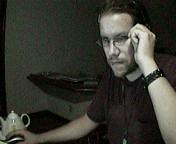K, news:
Progress continues at a2i2. I am pleased with the direction the project is going, and some few details I can give here, we are finally moving in the direction of integration, extension and scaling, which will (I believe) show us the value of the cognitive abilities we have been developing thus far in a much more unified and applicable way.
Also, the project has swung a bit away from biological inspiration(a good metric, but a poor teacher of structure), which I think will allow us faster progress, if we can stay grounded and pragmatic. There are simply many shortcuts that nature couldn't, or had no reason to take, that we may have been missing.
I am visiting SLC for the holidays, a whole week, in fact(don't ask me why, but airline prices being what they are, there are some odd deals).
I'll be around Nov 22nd to Nov 30th. I'm afraid I won't be visiting for Newtonmas(X-mas), so get your Justin while he is available! Family members and my girlfriend have first dibs, but I'd like to see friends and cohorts too.
The field of AI in general seems to be heating up a bit. There still aren't any projects that are general and ambitious, but there are more players, narrow AI funding and commercialization increases unabated, we have the relative newcomers of RNI publishing things now, and more activity on the conference and publishing front as well.
As supercomputers and custom software become the norm for people who need intelligent data handling, we'll see more and more interest in the direction of machine learning, adaptive systems, and other approximations of intelligence.
Starglider(Micheal Wilson), of sl4 fame, has an interesting new AI application to an ancient game. The perennial computer challenge of a decent Go player has been picked up again, and his attack is interesting. I've investigated GnuGo, a relatively strong open-source player in the past, and am very interested in his new computational statistics approach. I'm afraid I don't really understand enough of it's structure yet to comment intelligently, but I think he may be on to a structure general enough to allow large gains from what is essentially a standing start. Even achieving parity with more established Go programs from such a theoretical standpoint would be very impressive to me. Most of the current crop are very practical designs forged in constant ladder play tweaking and special case operations. DestinyGo(following some naming convention of his own) will probably be more widely available sometime relatively soon, but I wouldn't want to put words or plans in his mouth. Contact him for more details.
skip to main |
skip to sidebar

Some musings by your outlawpoet guide, with links, txts, and descriptions
About Me

- outlawpoet
- Justin Corwin is a pragmatic phlegmatic, with odd flashes of engineering insight.
Blog Archive
-
▼
2004
(242)
-
▼
November
(9)
- mm, mostly through my trip... still alive... haven...
- Keyhole An appropriate link for a traveling day. ...
- K, news: Progress continues at a2i2. I am pleased...
- The Price of Loyalty: The Bush Files: "'Publicit...
- United States IPv6 Summit 2004 - December 7-10, Re...
- Back from AC 04. I've got a lot of things to say ...
- I'm off to AC 04, and will be out of internet for ...
- Well, meeting Ben Goertzel was interesting. He's a...
- busy busy. I'm trying to get an answer from my si...
-
▼
November
(9)
"In the mirrors of many judgments my hands are the color of blood. I am a part of the evil that exists in the world and in Shadow. I sometime fancy myself an evil which exists to oppose other evils. I destroy Melkins when I find them, and on that Great Day of which prophets speak but in which they do not truly believe, on that day when the world is completely cleansed of evil, then I, too, will go down into darkness, swallowing curses. Perhaps even sooner than that, I now judge. But whatever... Until that time, I shall not wash my hands nor let them hang useless."
--Corwin "The Guns of Avalon" by Roger Zelazny
No comments:
Post a Comment